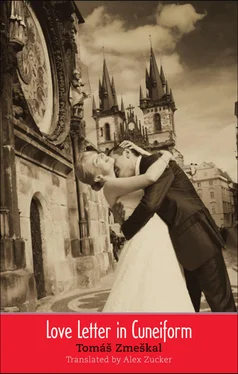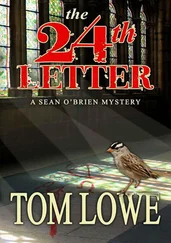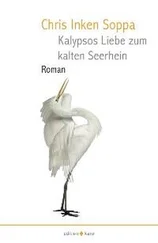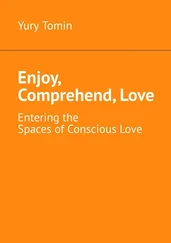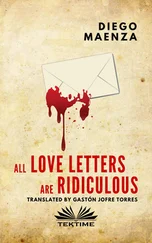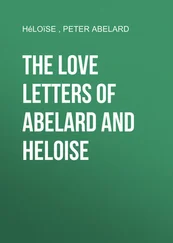“If you don’t mind, Duarte, get to the point, or we’ll all catch cold out here,” Václav said.
“Fine,” said Duarte. “You today are partial to illusions of equality, but we never suffered such illusions for a moment. What I wrote to him back then may be of use to you.”
“Maybe,” Václav replied in a menacing voice. “Yet every work has multiple meanings, multiple uses. To put it candidly and straightforwardly, every work, and therefore every life, no matter how small or trivial, is polysemous.”
“What does that mean?” the pastry chef said.
“That means,” Duarte went on, “that every work has more than one interpretation. The first is literary: from the Latin litera , meaning ‘letter,’ meaning literally literal. The others are allegorical, moral, and anagogical.”
“You’re going to have to stick it out in the woods on your own, you prick! Or my name isn’t František!” the pastry chef cried. It looked as if he was going to pounce on Duarte any minute. Dr. Lukavský got a little nervous, wondering whether he should intervene in the discussion, when all of a sudden he heard:
“What are you talking about?” said Václav. “You’re Marek, remember?”
“Oh, right,” Marek said, calm returning to his voice. “My apologies, friends, but long foreign words make me crazy.”
“Don’t worry about it,” said Duarte. “That’s why we’re here, right? So we can be under rigorous medical supervision. But perhaps I might explain by way of example, for example,” he said, unconsciously smacking his lips. “For example, take the example of Psalm 114, which tells us: ‘When Israel went out of Egypt, the house of Jacob from a people of strange language, Judah was his sanctuary, and Israel his dominion.’ That’s how it goes, yes, yes …” He smacked his lips drily again, then went on: “So just to plod along here, dissecting the words alone, what these words lined up like swallows on a wire actually tell us is that the sons of Israel walked out of Egypt under Moses’ leadership.”
“There were no telegraph wires back then, Duarte. What are you babbling?” Marek said.
“He’s right,” Václav chimed in. “There were no telegraph wires back then.”
“But there were swallows,” Duarte snapped back. He went on: “Meanwhile, allegorically, Psalm 114 speaks to us of redemption. Our redemption and ours alone, friends. Redemption through Christ our Lord. As for its moral meaning, well, even in this immoral land of ours and the area adjoining it, the moral meaning is a turning away of the soul from poverty and depressing sorrow toward a state of grace. As for the anagogical meaning, it signifies a liberation of the soul from the slavery of transgression into eternal glory and freedom. But please — I emphasize: please — this is not to be confused with liberté . All of these things may be called allegorical, seeing as they are neither literal nor historical. As I have just demonstrated, the obvious conclusion is that the material, the subject matter, must be twofold, double, or dual. In order for both meanings to apply.”
“If I understand you correctly,” Václav said, “it’s a little bit like an alternating-current generator. Only that has three phases, so it would be triple.”
“It might have something to do with the Holy Trinity, although in the interest of prudence I would just as soon avoid that for the moment,” Duarte said. “In principle, however, you’re most likely right.”
“If I understand all this correctly, the meaning of a myth ought to be Earth,” Václav said.
“Precisely, precisely,” Duarte cheered. “In our case, an Earth that has been raped. Although when we look around us, it certainly seems to enjoy it. And Earth has been allegorized as a raped woman since time immemorial.”
“Don’t you think that’s kind of a stereotype?” said Václav.
“Absolutely, absolutely, but there’s nothing I can do about it, and besides, I was hoping to have a little chat with you now about three-phase electric power and the threefold nature of God.”
“Brothers, I’m dying for a cigarette so badly I can taste it,” the pastry chef said.
“I can taste it too,” said Václav, standing up from the bench. Suddenly Dr. Lukavský realized they were talking about him. He put his book back in the gym bag, cleared his throat, stood up, threw the bag over his shoulder, and stepped around the bush.
“Hello, Marek,” he said.
“This is my brother doctor, friends,” said the pastry chef. “And these are my friends, doctor. This is Václav,” he said, pointing to a brown-skinned African man of average height eyeing the doctor suspiciously. “And this is Duarte,” he gestured toward his dumpier companion, who stood a half head shorter.
Duarte gave the doctor a kindly nod. “Greetings, Dottore. I’m Duarte. Duarte Alighieri, also known to my friends as Dante!”
The doctor gave them each a cigarette and offered Duarte a light. The African stuck his in his breast pocket and went on carefully watching the doctor.
“Well, I’m going to have to be on my way,” said Dr. Lukavský.
“We didn’t even notice you, brother doctor,” said the pastry chef. “It must be the white smock.”
“But I’m not wearing my smock.”
“Exactly, that’s what I mean,” the pastry chef said.
“I was just on my way to work,” the doctor said.
“Happy consultations,” said the African.
The doctor gave them all a quick glance and headed off for his office.
That day at lunch in the cafeteria, he sat down at a table with his colleague from the pavilion next door and told him about the conversation he had overheard.
“That one, the black man — actually he’s mulatto — his name is Václav and he’s been with us a month now. Knotty case. And the other one, that’s Dante.”
“Dante?” asked Antonín.
“Dante,” said his colleague.
“So how did that mulatto man end up with a Czech name, especially one as Czech as Václav?”
“He doesn’t talk much to anyone. Always reading and writing. Reads all sorts of things, I’ve noticed. The file he came in with said he knew Czech remarkably well for a black man.”
“I thought you said he was born here?”
“He was, but some people think no matter who a Czech mixes with, there’s no way their children can learn Czech.”
“Even if they were born here?”
“Even if they were born here.”
“And what do you think?”
“I don’t think anything. I don’t want to get in trouble.”
“Isn’t that kind of strange?” asked Antonín.
“Some people say it clearly proves that people of mixed background can never learn to speak proper Czech, even if they were born here. Never mind blacks.”
“Even if they were born here?”
“Even if they were born here. By the way, this is a revolutionary new theory.”
“Really? I didn’t think that kind of thing existed anymore. Theories of race and whatnot.”
“Don’t even say the word race . Are you crazy? I hope no one heard us,” Antonín’s colleague said, glancing furtively around the room.
“Fine,” said Antonín. “I won’t say the word race . But I thought theories like that went out with World War II.”
“World War II?” said Antonín’s colleague. “Now don’t get angry, Tonda, but you always were naïve. World War II?” Antonín’s colleague said again, rolling his eyes to emphasize his utter dismay at the backwardness of the Czechoslovak universe and the adjoining regions.
“So what’s the story with that Václav fellow? What is he doing here?” Dr. Lukavský asked.
“I asked the same thing, but he didn’t want to tell us too much. He just said he was writing something for fun and he’d appreciate it if we left him alone. Said he enjoys writing, even if he doesn’t know Czech that well. From which I deduced he probably knows about that theory.”
Читать дальше
